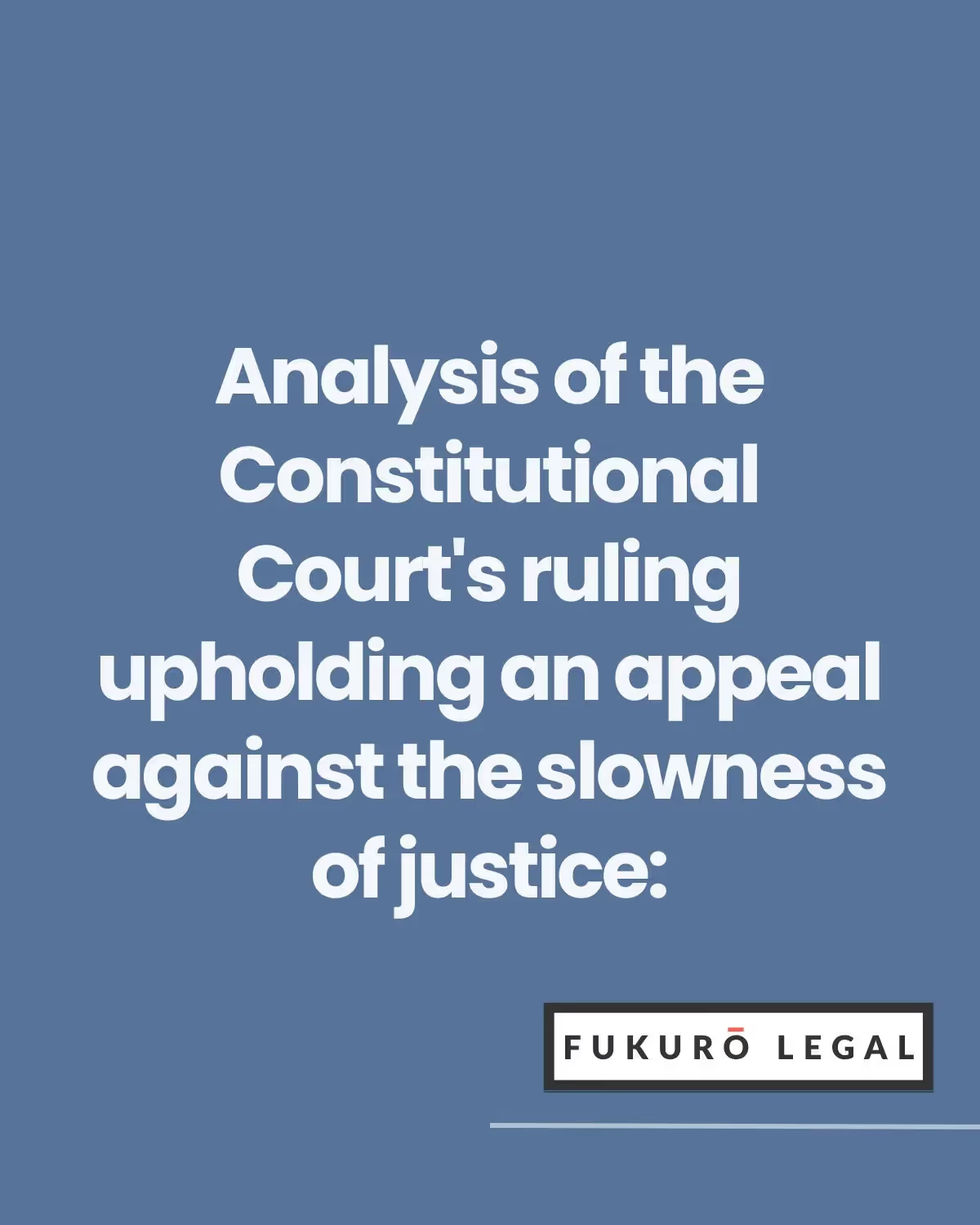Legal Context
The judgment analyses an appeal for amparo brought by a citizen who alleged a violation of the right to a trial without undue delay under Article 24.2 of the Spanish Constitution. The delay in holding her trial, set for three and a half years after the lawsuit was admitted, was justified by structural causes of the judicial system. The claim also included a request for compensation for the damages caused by the delay.
The Constitutional Court's decision not only recognises the infringement of the fundamental right, but also establishes a clear criterion on the possibility of claiming compensation from the State for the abnormal functioning of the justice system, in application of Article 121 of the Spanish Constitution.
Legal Basis of the Decision
Recognition of undue delay
The Court, after analysing the facts and previous case law, concludes that the delay of more than three years is excessive and unjustified, even considering the structural difficulties. This is what the court points out, where it argues that ‘The delay of more than three years, compared to what is established in the constitutional jurisprudence and to the average resolution times of equivalent cases by the social courts throughout Spain, is excessively long, even considering the effects of the delays accumulated due to the situation resulting from the COVID-19 pandemic’.
Irrelevance of structural causes
The Court stresses that the structural deficiencies of the judicial system do not excuse the violation of fundamental rights, as established by consolidated case law and reflected in this judgment: ‘The fact that the delay denounced is due to structural reasons, not directly attributable to the judicial body, does not prevent an assessment of the violation of the appellant's right to a trial without undue delay, as this situation does not alter its unjustified nature, insofar as the citizen is alien to these circumstances.’
Patrimonial liability of the State
The Court connects this violation with Article 121 EC, which imposes on the State the obligation to compensate for damages caused by judicial errors or by the abnormal functioning of the Administration of Justice ‘The injury to the right to a trial without undue delay generates, by mandate of the Constitution, when it cannot be remedied in any other way, a right to be compensated for the damages that such injury produces’.
Moreover, he reinforces this argument by citing STC 36/1984: ‘The constitutionally guaranteed right is not an empty right and its violation cannot be remedied in purely symbolic terms [...]. Undue delay constitutes the typical assumption of abnormal functioning of the administration of justice’.
Key arguments of the Court
Limitations of amparo as a remedy: The Court explains that, in cases of structural delays, the amparo remedy has limited effects because it cannot immediately alter judicial agendas. They detail this in the judgment stating that ‘The granting of amparo should not include the nullity of the contested decisions or any measure related to the anticipation of the appointment of the hearing, because, given the structural nature of the referred delays, this could aggravate the position of non-appealing third parties.’
Redress by way of compensation: The Court insists that the right to compensation is not a symbolic measure, but a real and effective way to repair the damage caused stating that ‘The limited effects of the judgments of this Court to repair the injury of the fundamental right not to suffer undue delay, can be counterbalanced by the corresponding compensation for an abnormal functioning of the administration of justice.’
Compliance with Article 121 EC: The Court recalls that the responsibility of the State is a constitutional mandate, whose regulation corresponds to the Law, but whose recognition is immediate when the damage is proven. ‘The Law may regulate the scope of such a right and the procedure for asserting it, but its very existence arises from the Constitution and must be declared by us.’
Legal and Social Implications
For citizens: The judgment reinforces the possibility for citizens to claim financial compensation when they suffer damages resulting from undue delays. This is especially significant in cases where delays affect economic or essential rights, such as access to social benefits.
For the judicial system: The opening of this avenue may generate an increase in pecuniary claims, putting pressure on the judicial system to implement structural improvements. The possibility of massive awards could act as an incentive to reform management and resource allocation.
For the administration: The recognition of compensation for undue delay imposes a potential financial burden on the state, which will have to assess damages and establish clear mechanisms for calculating and awarding compensation.
Compatibility with international standards
The ruling is also in line with the jurisprudence of the European Court of Human Rights, which insists that states must guarantee the right to a trial within a reasonable time, irrespective of structural causes. In cases such as Unión Alimentaria Sanders v. Spain (1989), the ECtHR established that ‘The structural nature of the delays does not absolve the State of its responsibility to ensure respect for the reasonable time limits set out in Article 6(1) of the European Convention on Human Rights’.
The judgment reinforces a line of jurisprudence consolidated by the Constitutional Court, but introduces a relevant nuance by emphasising compensation as a concrete measure to repair the damage, beyond the declaratory effects of the amparo.
Conclusion
The Constitutional Court's ruling represents a significant step forward in the protection of fundamental rights by recognising the possibility for citizens to claim compensation from the State for undue delays in judicial proceedings. This ruling reaffirms that structural deficiencies in the judicial system, such as work overload and lack of resources, do not justify the infringement of the right to a trial without undue delay, protected by Article 24.2 of the Constitution.
Furthermore, the Court reinforces the practical and effective nature of fundamental rights, establishing that undue delays constitute an abnormal functioning of justice that obliges the State, by virtue of Article 121 EC, to repair the damage caused by means of financial compensation. This measure not only provides individual redress to those affected, but also puts pressure on the judicial system and the administration to address the structural problems that generate these delays.
The decision strikes a necessary balance between guaranteeing individual rights and the structural reality of the judicial system, without absolving the state of its responsibility. This ruling not only protects citizens' rights, but also encourages reforms to improve the efficiency of justice, marking an important step forward in the consolidation of the rule of law and confidence in institutions.

